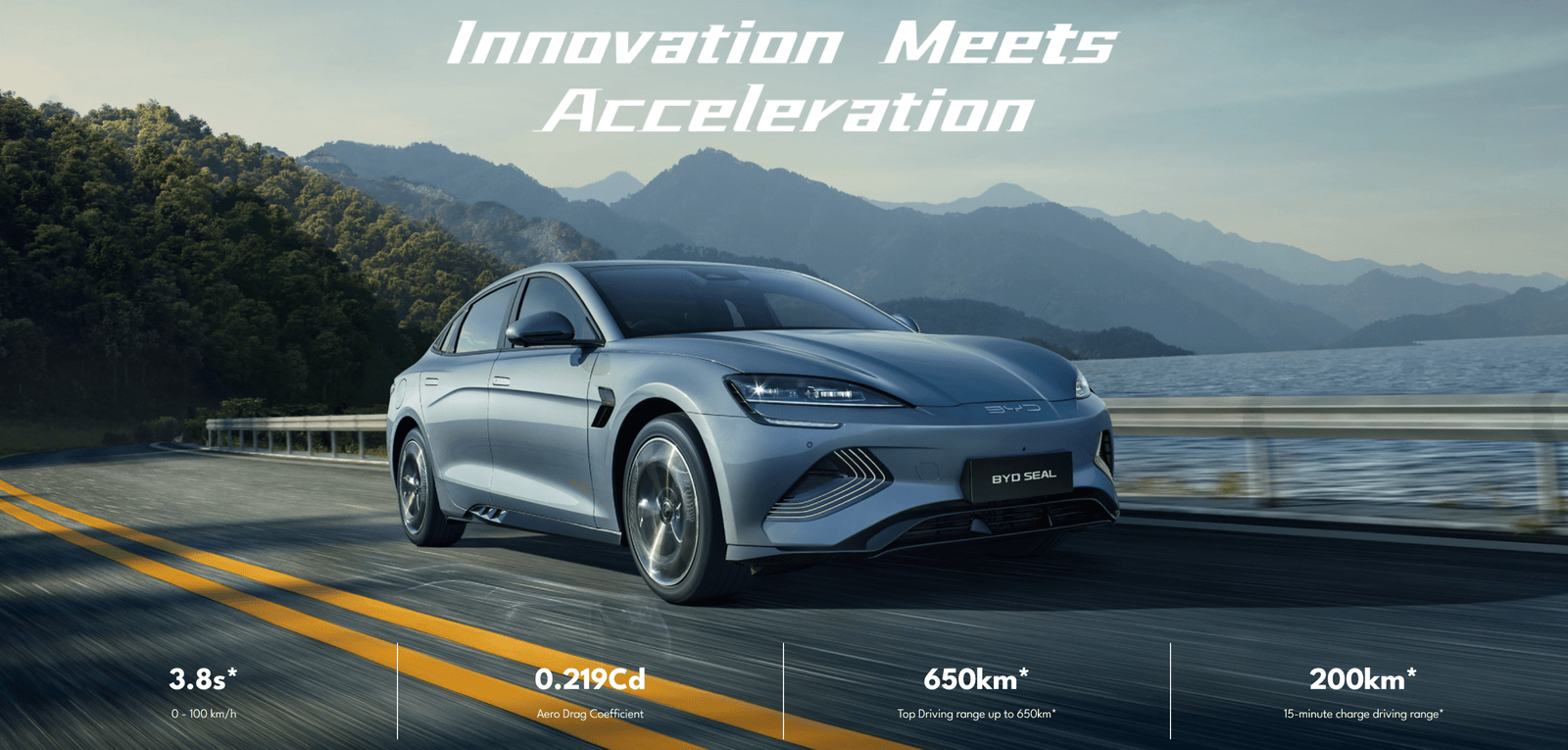The Indian electric vehicle (EV) landscape is rapidly evolving, and the recent arrival of the BYD Seal is a major turning point. This sleek electric sedan, launched on 5th March 2024 after its announcement in 2023, offers a compelling package for Indian car buyers looking to embrace sustainable mobility. But with a Chinese brand at the helm, some might be hesitant. Let’s delve into the BYD Seal’s features and see if it deserves a spot on your 2024 EV shortlist.
Table of Contents
Aesthetics That Turn Heads, Speed that is Unmatched
First impressions matter, and the BYD Seal stuns with its futuristic design. Imagine a four-door coupe with a flowing silhouette, sharp lines, and a sporty stance. BYD Seal goes from 0-100 km/hr in just 3.8s* It’s a head-turner on the road, a far cry from the boxy designs often associated with traditional EVs.
Range Anxiety? Not Here!
One of the biggest concerns for EV buyers is range anxiety. The BYD Seal addresses this brilliantly. It boasts a claimed range of up to 650 km on a single charge, which is exceptional in the Indian market. Not just this, the company claims to offer up to 200km of range in just 15 minutes of charge.
BYD Seal has a Vehicle To Load Mobile Power Station. Vehicle To Load turns BYD SEAL into mobile generator which is better suited for camping & outdoor activities
BYD Seal Safety Rating
Safety remains paramount, especially with a new brand. The BYD Seal has undergone rigorous testing and is expected to receive a high safety rating from Global NCAP, a well-respected independent body that assesses car safety across the world. Additionally, BYD is known for its commitment to using high-quality materials and robust engineering in its vehicles.
Beyond the Badge: A Trustworthy Brand
The Indian government is actively promoting EVs to reduce carbon footprint. BYD, a pioneer in battery technology, is committed to sustainability. The BYD Seal is expected to receive certification from the government for its eco-friendliness, ensuring responsible battery sourcing and recycling practices.
While brand recognition plays a role, it’s important to look beyond the label. BYD is a global leader in EV technology, backed by Warren Buffett’s Berkshire Hathaway.
The company has a proven track record of success in several countries and plans to cover 90 percent of the EV market in India by the end of the year as it strengthens its leadership position in EVs priced above Rs 30 lakh category, as per Sanjay Gopalakrishnan, Senior Vice President of BYD India’s Electric Passenger Vehicle Business.
The BYD Advantage: More Than Just Specs
The BYD Seal offers several advantages over other EVs in the market, including Tesla. In fact, In Q4 2023, BYD outperformed Tesla in battery-only car sales, selling 526,000 units compared to Tesla’s 484,500. BYD’s vehicles are generally priced lower than Tesla’s, making them accessible to a broader market segment.
- Competitive Pricing: Expected to be priced between ₹41 lakh and ₹53 lakh (ex-showroom), the BYD Seal falls within the range of popular EVs in India, making it potentially more affordable than Tesla models.
- Advanced Features: The Seal boasts a modern digital dashboard, a plethora of advanced driver-assistance systems (ADAS), and a user-friendly infotainment system, keeping pace with what Tesla offers.
- Fast Charging: With BYD’s fast-charging technology, you can recharge the battery significantly in just 15 minutes, perfect for quick top-ups during long journeys, potentially faster than some Tesla Supercharger options.
A New Era for EVs in India?
The BYD Seal’s arrival signifies a shift in the Indian EV market. With its stunning design, exceptional range, safety certifications, and commitment to sustainability, it offers a compelling alternative to existing options, including those from Tesla. While brand perception might be a hurdle, BYD’s global success, long-term vision, and potential affordability inspire confidence.
The Final Verdict
The BYD Seal isn’t just another EV; it’s a potential game-changer. Before finalizing your 2024 EV purchase, take a closer look at the BYD Seal. It might just redefine your expectations for style, range, and value in the electric car segment, even when compared to established brands like Tesla.
Disclaimer: This blog post is based on publicly available information and expected specifications. Final specifications, pricing, safety ratings, and certifications may vary.

